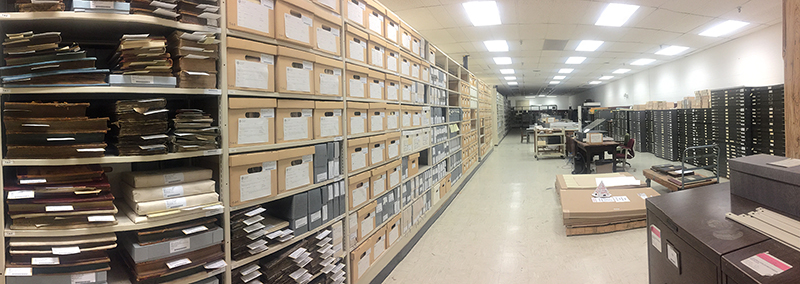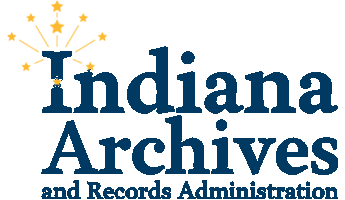
Overview | IARA History | Volunteer | Donate
Overview
The Indiana Archives and Records Administration (IARA) assists State and local government entities in the cost-effective, efficient and secure management of governmental records, by providing services throughout the life cycle of records, including creation, use, storage, and disposition.
IARA is governed by IC 5-15-5.1 and works with county commissions of public records, governed by IC 5-15-6. The Oversight Committee on Public Records approves IARA Policies and promulgates administrative rules through Title 60 of the Indiana Administrative Code.
IARA personnel are eager to share knowledge within their areas of expertise. Contact arc@iara.in.gov if you would like to arrange a tour or inquire about a special presentation for a group.
IARA Divisions
State Archives
The Indiana State Archives exists to protect and provide access to primary-source and historical government documents, and those that contribute to Indiana's heritage. Our services provided to the general public, include genealogical and historical research assistance, closed-school transcript requests, and tours and programming.
Records and Information Management
The Records and Information Management Division provides assistance in the management of public records to State and Local government agencies in Indiana; the Electronic Records Program assists all Indiana government entities with the challenges of using, preserving, and transferring records in digital formats.
State Imaging and Microfilm Laboratory
The State Imaging and Microfilm Laboratory provides cost-effective imaging and microfilming services to Indiana government pursuant to standards adopted by the State of Indiana.
State Records Center
The Indiana State Records Center provides State government with secure storage, transport and destruction of inactive records.
Related Entities:
- Indiana Oversight Committee on Public Records
- Indiana State Historic Records Advisory Board
- Indiana Public Access Counselor
- State Government Agencies
- County and Local Government Agencies
IARA History
The Indiana State Archives first began as an experimental division of the Indiana State Library in 1906. For several years, the Archives operated under the direction or Earlham University Professor Harlow Lindley on a half time basis. Lindley scoured the state agencies determining what surviving original documents should be transferred to the Archives. He also determined which of the old records that had previously been placed in the custody of the State Librarian should be in the newly formed Archives. He published his recommendations in 1910 as Report on the Archives of the State of Indiana. Following much of his advice, the Indiana General Assembly passed House Bill 254, on March 6, 1913, as Chapter 116, AN ACT concerning the organization of the departments of the state library.
The Archives existed as the Department of Indiana History and Archives, a division of the State Library, until 1933, when it became a standalone Archives Division.
In 1979, the Archives was transferred into the newly created Indiana Commission on Public Records, whose divisions at the time included Forms Management, Records Management, State Records Center, State Imaging and Microfilm Lab, and the Conservation Lab. In 2016, the Commission on Public Records was legislatively renamed to the Indiana Archives and Records Administration.
In 2023, legislative updates resulted in Forms Management becoming a program, rather than a division, now offering forms design standards and a central online repository, but putting the design responsibilities and choices back in the hands of the agencies themselves.
Together with the administrative staff, the remaining IARA divisions create, manage, distribute, and preserve the information of the State of Indiana through efficient and fiscally responsible policies and procedures:
- The lifecycle of all government information and record keeping begins when a record is created or received by a government agency.
- This record is then destined, via a records retention schedule (Records and Information Management), for ultimate destruction or preservation. The record may be:
- stored temporarily and then destroyed (State Records Center, or on-site within the agency), or
- preserved permanently as an historic record (State Archives).
- Some important records are converted, digitized, or microfilmed (State Imaging and Microfilm Laboratory), or are restored and/or repaired (Conservation Lab).
The Oversight Committee on Public Records functions as the policy-making body for the Administration, and consists of designees from the Governor, Secretary of State, State Board of Accounts, Department of Administration, and Office of Technology, as well as the Director of the State Library, the Executive Director of the Archives and Records Administration, the Indiana Public Access Counselor, a County Clerk who is also the Secretary for their own County Commission of Public Records, and two lay members appointed by the Governor for four-year terms.
The Administration's role is to safeguard public information, reduce paperwork, preserve Indiana's history, and improve the efficient operation of state government.
Volunteer
Indiana Archives Volunteers
The volunteer experience at the Archives is rewarding and enjoyable.
Since the volunteer program began in 1991, volunteers have donated over 100,000 hours to the Indiana Archives! Volunteers have been the driving force behind the Research Indiana Index.
If you are interested in volunteering at the Indiana Archives, we offer a variety of projects from which to choose, flexible hours, an ability to volunteer from home with internet access or a friendly working environment, and free parking at the Archives. In person projects vary widely. Some involve data entry, but many do not require any computer expertise. There are several collections that need to be preserved by simply removing them from their acidic folders and boxes and placing them in acid free archival materials. To volunteer in person, call 317-591-5222 or email arc@iara.in.gov.
Virtual Volunteers
Help the Indiana Archives increase online access to historical content from the comfort of your home. Anyone with an internet connection will be able to help create searchable indexes by indexing records. Together, we can make Indiana history accessible to everyone. Visit our profile on Fromthepage.com to see our most recent virtual projects.
Join the Friends of the Indiana State Archives
The Friends of the Indiana State Archives is a not-for-profit organization formed to promote the interests of the Indiana State Archives in its official capacity of preserving public records of Indiana’s Heritage. In cooperation with the staff of that public trust, FISA seeks to identify and make known the needs of safely housing the state collections; publicize the resources and needs of the Archives; raise funds to supplement its resources and services; recruit volunteers to assist the staff; encourage scholarly use of the collections; sponsor outreach programs throughout the state; and devise ways to expand public access to the Archives.
- Visit the FISA website
- Read their newsletter, Archives Current
*Please note that issues of Archives Current require Adobe Acrobat Reader to view.
Donate
Help Support Indiana Transparency and History
The Indiana Archives and Records Administration acknowledges the great importance of gifts and donations to the State Archives’ operations and to its future development. All donations to the Indiana Archives are tax deductible.
Donate online
You can donate directly to the Archives online with Visa, MasterCard or Discover. The form is secure.
Donate via mail
Please fill out this form and send it with your check or money order to:
Indiana Archives and Records Administration
402 West Washington Street, Room W472
Indianapolis, IN 46204
Donations of Archival Material
As a government archives, the Indiana State Archives does not generally accept donations of non-governmental materials from the public. The Archives encourages patrons wishing to donate historical material to seek out a local repository, such as a county public library or historical society, for items of local interest. For items relevant to the history of the entire State, the Indiana Historical Society or Indiana State Museum may be appropriate repositories.

